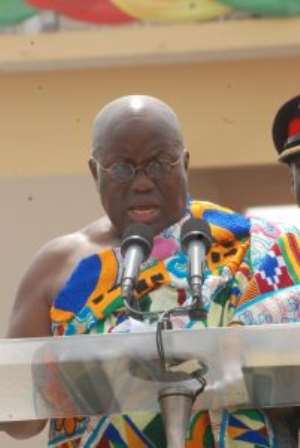
Cape Coast, Nov. 21, GNA - Mr Felix Agyei Amakye, Lecturer at the Institute of Local Government Studies (ILGS) has urged Government to make conscious effort to engage all stakeholders to solicit their input in the creation of new District Assemblies.
He called for great care in carrying out the exercise so that it did not arouse sectional emotions and satisfied parochial interests.
Mr Amakye gave the advice in an interview with the Ghana News Agency on the sidelines of a day's stakeholders forum to educate the various decentralised departments of the district assemblies and how it functioned.
The workshop was organised by the Ministry of Local Government and Rural Development in collaboration with the Inter-Ministerial Co-ordinating Committee on Decentralisation and the Institute of Local Government Studies (MLGRD).
Mr Amakye urged government to also take into consideration the availability of economic activities, such as farming, mining and weekly or daily markets from which revenue could be derived
He said, that would help reduce the spate of petitions and grievances that had over the years characterised the creation of new districts and constituencies in the country.
Additionally, the engagements would help foster a common understanding and mutual co-operation so that concerns of stakeholders would be amicably addressed.
In attendance were officials of the Ghana Education Service (GES), Ghana Health Service (GHS) and the Community Development and Social Welfare Department (CDSWD) of all the 20 Assemblies in the Central Region.
On the criteria for demarcation of boundaries, he said besides the element of population, the Local Government Act, 2016, (Act 963) took into account geographical considerations and economic viability with the ability of an area to provide the basic infrastructural and other developmental needs from the monetary and other resources generated in the area.
"The criteria for the demarcation of new administrative and electoral boundaries will be based on population, economic viability and existing basic infrastructure'
Mr Amakye said demarcation of physical boundaries would eliminate disputes and pave way for both government and NGOs to implement national and local specific policies and programmes towards the development of such designated areas to stimulate national development.
Touching on the emergency of the various decentralized Departments under the assemblies, he explained that it would drastically eliminate duplication of functions between agencies at the sub-national level, relieve managers at the centre of routine tasks and simplify complex bureaucratic procedures, transfer competence and ensure rational use of existing limited human resources.
It would also enhance close relationship and inter-relationship between the agencies being merged and create synergy, provide environment for the exchange of ideas and skills by personnel who hitherto had been operating within the confines of their separate entities.
Mr Jonathan Azasoo, a Deputy Director at the National Development Planning Commission, explained that the new Act 936 was passed to replace Act 462 because it contained limitations, inconsistencies, duplication and conflicts, which made the work of the assemblies difficult.
He said the new Act 936 was merged with five different Acts after a vigorous reviewed process was made on those Acts and urged all the various decentralised departments to acquaint themselves with Act to enable them function effectively.
He noted that there would be conflicting roles that would make the work of the assembly difficult if they were not abreast of the Act.




 This IMANI job no dey pap; the people you are fighting for are always fighting y...
This IMANI job no dey pap; the people you are fighting for are always fighting y...
 Prof. Naana Opoku-Agyemang has changed; you can see a certain sense of urgency –...
Prof. Naana Opoku-Agyemang has changed; you can see a certain sense of urgency –...
 MFWA Executive Director slams Akoma FM for engaging in ‘irresponsible’ media pra...
MFWA Executive Director slams Akoma FM for engaging in ‘irresponsible’ media pra...
 ‘Women must become millionaires too’ — Prof Jane Naana on establishment of Women...
‘Women must become millionaires too’ — Prof Jane Naana on establishment of Women...
 Some believe only in Ghanaian votes, not Ghana — Kofi Asare jabs politicians
Some believe only in Ghanaian votes, not Ghana — Kofi Asare jabs politicians
 Plan to make BEST sole aggregator of Sentuo Oil Refinery will create market chal...
Plan to make BEST sole aggregator of Sentuo Oil Refinery will create market chal...
 2024 elections: I can't have the man I removed from office as my successor — Aku...
2024 elections: I can't have the man I removed from office as my successor — Aku...
 2024 Elections: Immediate-past NPP Germany Branch Chairman garners massive votes...
2024 Elections: Immediate-past NPP Germany Branch Chairman garners massive votes...
 Gov’t focused on making Ghana energy self-sufficient, eco-friendly – Akufo-Addo
Gov’t focused on making Ghana energy self-sufficient, eco-friendly – Akufo-Addo
 April 25: Cedi sells at GHS13.74 to $1, GHS13.14 on BoG interbank
April 25: Cedi sells at GHS13.74 to $1, GHS13.14 on BoG interbank
